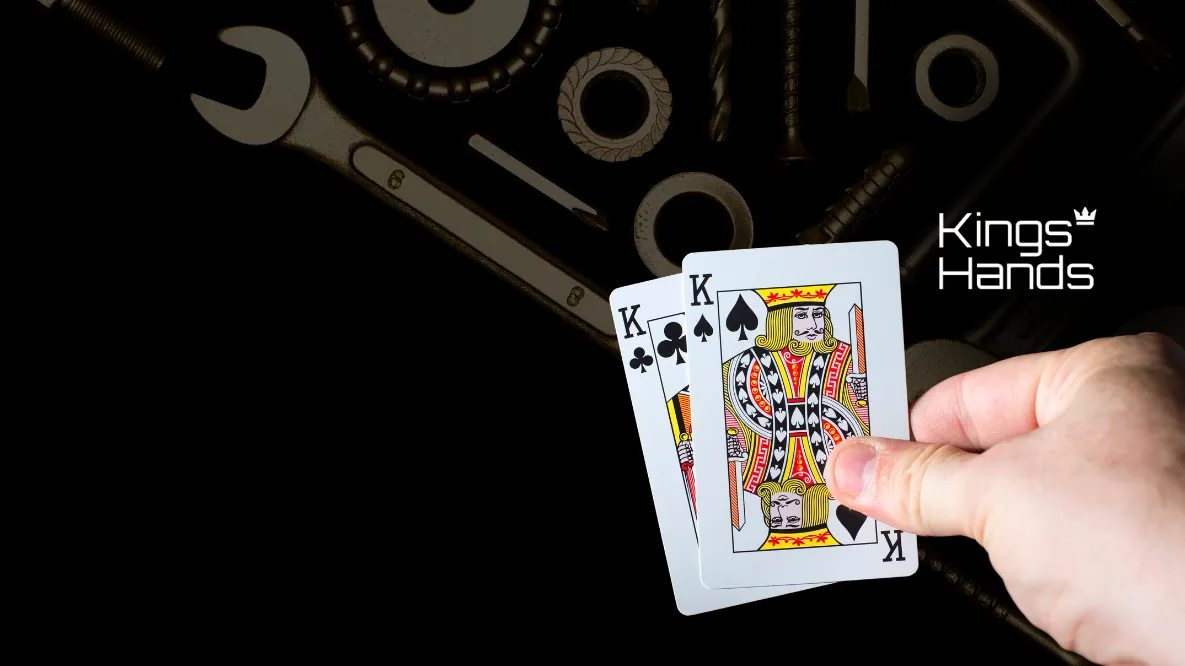Variance can be cruel, or uplifting, negative or positive. One thing’s for sure – it’s here to stay. Even the best players in the world are subject to it.
As Richard Swift put it in the awesome song of the same name,
“But I wish sometimes that Lady Luck, she would find some time to spend with me”.
We can relate, Rich!
What is Variance?
Variance is the term given to the uncertain short-term outcomes for which poker is well known, but it can of course apply to the swings in fortune you will see in any game where luck plays a role.
The good thing about luck, of course, is that it is borrowed, not owned.
In the long run everyone will roll an equal number of sixes, if we sit around rolling dice. The long run can be very long indeed (arguably millions of hands depending on the game format in question), but in the longest of long runs, luck will be distributed entirely evenly across all players, leaving only skill to determine who is ahead.
This is the case with any game where the skill element is significant enough to play a major role, which there is no doubt that it is in poker, well established as a +EV skill game (positive equity value), meaning that it is beatable by dint of skill if you are sufficiently better than your opponents (and if you are not playing <10bbs deep and/or with insanely high rake).
Does Variance Matter?
If you have infinite (or just very large) bankroll and the patience of a Buddha, variance doesn’t really matter, as you can simply endure (or even enjoy!) the potentially seismic swings and treat it as the thrills of the rollercoaster. For all of us mere mortals, variance tends to matter, or at least feel that it matters, a good bit.
It can be pretty rough to play through a big downswing, and it can also certainly cause you to second-guess your play, perhaps in spots where there is no need to do so. It’s certainly true that most experienced downswings tend to be a combination of variance and human errors, which will of course compound any impact which variance has on your play. Telling one from the other can be pretty tricky.
On the flip side, positive variance is also a thing, though fewer people tend to realise they are experiencing it. If you find yourself on the positive side of variance, especially near the start of your poker journey, you may simply feel that you are God’s gift to the game, long before your poker skills are really honed. This may give you a feeling of complacency which can limit your ability to grow as a player, or cause quite a shock when you hit your first downswing.
Measuring Variance
The tools are now available to measure variance really quite accurately, at least in terms of understanding how much of it exists in different types of poker games. This very fine tool from PokerDope is the best one online for doing exactly that, and you can program the settings of this calculator to measure how likely you are to have certain outcomes at a certain skill level in a certain MTT or SNG. There’s also a similar calculator for cash.
To save you some trouble, we can provide some good rules of thumb for you right here in this article. If you’re playing cash poker and you are confident that you have a skill edge on the field, you likely need at least 30-40 buy-ins to avoid much risk of ruin (going busto) especially if you are multi-tabling or playing zoom format. For a SNG grind that goes up to at least 75-100 buy-ins, which is also a good minimum for micro stakes MTTs. If you move up to the midstakes or higher for MTTs, you really should be sitting down to play with at least a few hundred buy-ins available. For all formats this should be measured against your average buy-in.
Managing Variance
If you choose to control the amount of variance which you encounter, instead of simply “embracing the ride” as remarked above, we’d be in agreement that this is generally wise, and a good way of having a lower stress existence and enjoying the game to the max.
Should you go this route, there are a number of ways in which you can control the amount of variance in your poker grind right from the off, and a lot of it comes down to game selection.
As noted above, choosing cash as your main grind is one way to go, as you certainly need the fewest buy-ins in your bankroll to weather the variance. This is simply due to the fact that chips are chips in cash poker, and you can sit and stand up as you please. MTT players on the other hand might run great at the start of a tourney and terrible at the end, or vice versa, and this is one reason there is a lot of variance in the MTT grind.
If you do play cash, you can further reduce the impact of variance by buying in with 100bbs rather than 200bbs, or by sitting out when you reach 150 or 200 big blinds, and sitting a new table with 100, especially if you have more skill edge with 100 big blind stacks. Bear in mind this will also cap your potential value gained in each pot.
Another way to crush variance is simply to table select well and to sit spots where you have a large skill edge, as the impact of variance will be less the more profitable you are in a game. Long-handed tables also have less variance (and sometimes less value) than short-handed.
If we’re talking SNGs or MTTs, the smaller the field size, the less impact variance will tend to have. It is really not possible to measure your skill level according to your financial results in MTTs for example until you have a game sample of many thousands of games played, simply due to the size of the potential swings. So the gold standard for a low variance MTT grind is soft field, small field size, good structure. If you want to reduce it still further, knockouts and progressives reduce variance since you can win money before the bubble, though again your potential ROI (return on investment) will also be more capped in these games.
Making Peace with Variance
However much you opt to control the impact of variance on your play, it is important to realise that it’s a baked-in part of the game of poker, and that this is a good thing. Frankly, the fun players wouldn’t keep coming back to the game if they had no chance to win in the short-term. This is especially true of the MTT world, where beginners (with a bankroll!) can rub shoulders with the best in the world, something which you can say for very few sports or competitive endeavours on this Earth.
Variance keeps the poker world turning, and without it we would literally just have a bunch of battle-hardened regulars out-grimming one another at the felt all day long and playing for razor thin edges. Every game would be the Hot $215 on Pokerstars, essentially.
The good news is that it is possible for you to make peace with variance and not to sweat its impact on your game, past taking sensible steps to limit this as noted above. Beyond that it is important to find equanimity, and to accept that we are going to frequently face outcomes we don’t want in a poker game, there is literally no way to avoid that. Don’t go folding those Jacks just because you might have tough spots with them, it’s all part of the ride.
Some simple steps to achieving a zero-tilt mentality with regard to variance are to remind yourself, if you’re an MTT player, that you will frequently finish 11th, or 9th, or 24th when you make that deep run. If you’re a cash player, you’ll have downswing days, don’t sweat it and don’t chase those losses. Suffering over variance has compounded many a poker player’s losses as they go on tilt after a casual player hits a 2-outer against them in a 400bb pot and they get steamed and start to punt, throwing bad money after good (to reverse the old saying).
If you’d like to read more PokerDeals guidance on mindset, check out our PokerDeals Mindset 101 post here.
Breathe, remember it’s better than working down the mines, and remember how lucky we are able to sit and play this beautiful game. In the long run you’ll deal out exactly as many bad beats as you’ll receive. You can’t avoid that, but you can certainly avoid stressing out over it. Enjoy the game. If it’s no longer fun, it’s time to hit the beach, the mountain trails, or just sit down with a friend or lover and get some real life EV time.





















